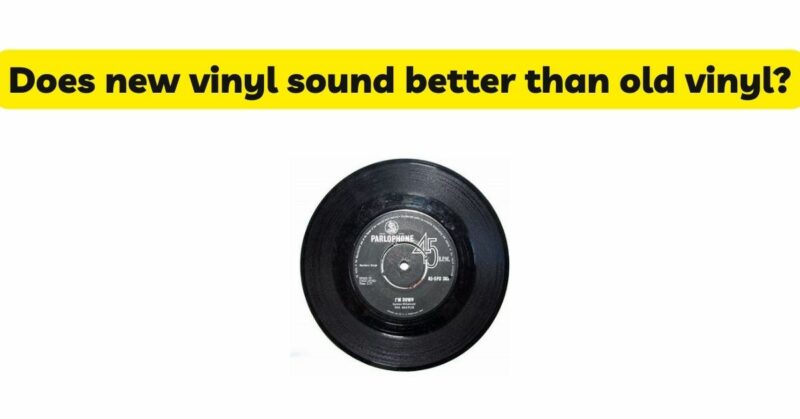Vinyl records have experienced a resurgence in popularity, capturing the hearts of music enthusiasts around the world. As the demand for vinyl continues to grow, a debate arises regarding the sound quality of new vinyl records compared to their older counterparts. In this article, we will explore the nuances between new and old vinyl records and examine the factors that contribute to the sonic characteristics of each. By understanding the manufacturing processes, mastering techniques, and vinyl quality, we can gain insight into whether new vinyl truly surpasses the sound quality of old vinyl or if the allure of the vintage experience still holds its ground.
Manufacturing Processes: The manufacturing processes employed for new vinyl records have improved over time. Modern pressing plants often utilize advanced technologies and machinery to achieve higher precision in the creation of records. The use of computer-controlled pressing machines and optimized techniques can result in records with better consistency, reduced surface noise, and improved overall sound quality.
Mastering Techniques: The mastering process plays a crucial role in the sound quality of vinyl records. While older vinyl records often benefited from analog mastering techniques, new vinyl records can also feature meticulous mastering processes. Mastering engineers today have access to advanced digital tools and techniques that allow for greater control over the audio, resulting in cleaner recordings, enhanced dynamics, and improved fidelity.
Vinyl Quality: The quality of vinyl used in both new and old records is a determining factor in sound reproduction. Older vinyl records may have been pressed with higher-quality formulations that were known for their durability and sound fidelity. However, advancements in vinyl production have led to the development of high-quality vinyl compounds and formulations for new records, which can result in comparable or even superior sound quality.
Original Recordings: An essential aspect to consider is the original recording itself. Both new and old vinyl records can feature original recordings that may have been captured using different techniques. Modern recordings are often done with digital equipment, while older recordings may have been captured using analog equipment. The choice of recording techniques and equipment can influence the overall sound quality and character of the record, regardless of whether it is new or old.
Remastering and Reissues: New vinyl records often include remastered versions of classic albums or reissues of older recordings. Remastering involves revisiting the original analog or digital tapes and applying modern techniques to enhance the sound quality. With meticulous remastering, new vinyl releases can offer improved clarity, dynamics, and overall fidelity, giving listeners an opportunity to experience classic albums with enhanced sound quality.
Individual Pressings and Variability: It is important to note that sound quality can vary among different pressings of both new and old vinyl records. Factors such as the pressing plant, mastering engineer, vinyl weight, and quality control can contribute to variations in sound reproduction. Therefore, the sound quality of a particular record can depend on the specific pressing and manufacturing quality, rather than solely on whether it is new or old.
Subjective Perception: Sound perception is subjective and can vary from person to person. Factors such as personal preferences, listening equipment, and environmental conditions can influence how individuals perceive the sound quality of vinyl records. Some listeners may prefer the warmth and nostalgia associated with the sound of old vinyl, while others may appreciate the enhanced clarity and fidelity offered by new vinyl releases.
Conclusion: Determining whether new vinyl sounds better than old vinyl is a complex matter that encompasses various factors, including manufacturing processes, mastering techniques, vinyl quality, original recordings, and individual preferences. While advancements in technology and manufacturing have resulted in improved sound quality for new vinyl records, the vintage charm and character of old vinyl still hold a special place in the hearts of collectors. Ultimately, the choice between new and old vinyl records depends on individual preferences and the specific sound qualities that resonate with each listener. Regardless of the vinyl’s age, the joy of vinyl listening lies in the immersive and tactile experience it offers, allowing us to connect with music in a unique and engaging way.


